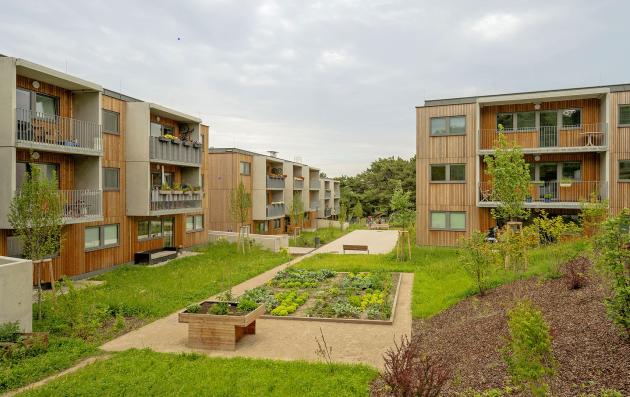Date of label : 29/10/2024
-
Vienna , Austria
-
Size of city : 2.000.000 inhabitants

Residential complex with modern, sustainable housing units. The buildings have a mix of concrete and wooden façades, with balconies adorned with plants. The area between the buildings features green spaces, including a communal garden with raised beds for growing vegetables or flowers. The overall design emphasizes eco-friendly living and community interaction.
Summary
Vienna (AT) holds a leading global position in social housing, in terms of both quantity and quality, and the range of affordable, high-standard housing in the city is being continually expanded. Developers’ competitions are a key tool for achieving this success.
The Property Developers’ Competition is an instrument by wohnfonds_wien (fonds für wohnbau und stadterneuerung / Fund for subsidised Housing and Urban Renewal) ensuring the construction of innovative, sustainable, socially inclusive and affordable housing by private propoerty developers.
To assess the quality of social housing, Vienna has established an easily transferable 4-pillar model focussing on economy, social sustainability, architecture, and ecology.
The solutions offered by the Good Practice
Every subsidised new-build project in Vienna must be assessed on the basis of quality criteria, for example, through a Property Developers' Competition procedure.
A Property Developers' Competition is set for all properties of the wohnfonds_wien and for plots with over 500 subsidised housing units (guideline value). Both non-profit and commercial developers can take part in these competitions, for which they must form a project team with the architect of their choice.
Submitted projects are evaluated by an interdisciplinary experts’ jury and subsequently recommended for funding.
The 4-pillar model assessment is based on clearly-defined quality criteria:
Economy: Basic costs, total building costs, user costs and contract conditions.
Social sustainability: Suitability for daily life, cost reduction through planning, living in a community, housing for changing needs.
Architecture: Building and apartment structure.
Ecology: Climate-friendly construction that conserves resources, healthy and environmentally-conscious housing, and green outdoor spaces.
Building on the sustainable and integrated urban approach
The 4-pillar model requires a holistic view of a development’s urban challenges. Only projects of sufficient quality that balance all four quality criteria are considered.
Based on a participatory approach
Entries are evaluated by a specialist jury of experts in architecture, urban planning, ecology, economics, building technology, housing law, and social sustainability, and representatives of the relevant municipal districts, the wohnfonds_wien, and external jurors.
What difference has it made?
Since 1995, developers’ competitions have led to around 46 000 subsidised flats, and housing for around 100 000 people. This transparent process promotes creativity and innovation, and it increases quality across Vienna’s housing sector, particularly in architecture, open space planning, resident participation, and social sustainability.
Today, subsidised housing in Vienna delivers better quality than the profit-oriented sector (wohnbund_consult 2022 research).
Property Developers' Competitions have increased levels of research on housing at universities and provided a valuable impetus for discussing questions such as, how should affordable residential housing be designed, what does it take for certain groups (single parents, elderly people, etc.) to feel comfortable at home and how can affordable housing be guaranteed despite increased demands.
Why this Good Practice should be transferred to other cities
Vienna’s Property Developers' Competition model serves as an inspiring example for affordable, sustainable and innovative housing all over Europe. Key elements include non-profit housing, rental costs, the return of surpluses to the system, asset retention, limited business activities, and strict oversight.
The easily transferable 4-pillar Property Developers' Competition model is not only an assessment tool, but also a significant contribution to the New European Bauhaus initiative. It also supports European programmes, like URBACT, that encourage knowledge sharing.
The Property Developers' Competition in Vienna is a special public procurement procedure that can easily be transferred to other cities, as almost every city owns land that it can reserve for social housing. The 4-pillar model can be adapted to the respective priorities and challenges of other cities.
The Viennese model shows that affordable housing requires the public sector to intervene, with subsidies, zoning and other instruments that are transparent and fair. Transferring the developer's competition also requires attention to local legal and cultural conditions for social housing.
Every year, wohnfonds_wien welcomes between 20 and 40 international delegations who want to learn more about Vienna’s model for social housing. Due to this demand, an English-language booklet was produced to explain the developers' competition.
